

An%C3%A1lisis%20terminable%20e%20interminable. Jacques-Alain Miller. Jacques-Alain Miller (French: [milɛʁ]; born 14 February 1944) is a psychoanalyst and writer.
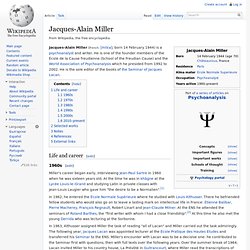
He is one of the founder members of the École de la Cause freudienne (School of the Freudian Cause) and the World Association of Psychoanalysis which he presided from 1992 to 2002. He is the sole editor of the books of the Seminar of Jacques Lacan. Life and career[edit] 1960s[edit] Miller's career began early, interviewing Jean-Paul Sartre in 1960 when he was sixteen years old. In 1962, he entered the École Normale Supérieure where he studied with Louis Althusser. In 1963, Althusser assigned Miller the task of reading "all of Lacan" and Miller carried out the task admiringly.
Miller's written texts from this early period are published in the Gallimard collection, Un début dans la vie (2002) which includes his interview with Sartre and the influential text presented at Lacan's Seminar (24 February 1965), "Suture: Elements of the Logic of the Signifier". Self psychology. Self psychology is a school of psychoanalytic theory and therapy created by Heinz Kohut and developed in the United States at the Chicago Institute for Psychoanalysis.
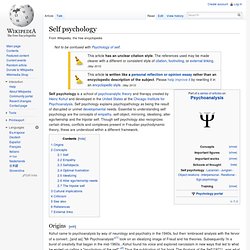
Self psychology explains psychopathology as being the result of disrupted or unmet developmental needs. Essential to understanding self psychology are the concepts of empathy, self-object, mirroring, idealising, alter ego/twinship and the tripolar self. Though self psychology also recognizes certain drives, conflicts and complexes present in Freudian psychodynamic theory, these are understood within a different framework. Origins[edit] Kohut came to psychoanalysis by way of neurology and psychiatry in the 1940s, but then 'embraced analysis with the fervor of a convert...
Kohut argued that therapy should be more involved with the patient than with analytical theories. Concepts[edit] CARL GUSTAV JUNG (HOLOGRAMA) 1º Parte. Carl Gustav Jung Documentary Pt. 1 of 2. Cara a Cara con CG Jung. CG Jung - Feminine Archetype. Ernest Jones. Psicoanálisis. El psicoanálisis (del griego ψυχή [psykhé], alma o mente y ἀνάλυσις [análysis], análisis, en el sentido de examen o estudio) es una práctica terapéutica fundada por el neurólogo austríaco Sigmund Freud alrededor de 1896.
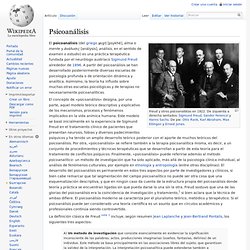
A partir del psicoanálisis se han desarrollado posteriormente diversas escuelas de psicología profunda o de orientación dinámica y analítica. Asimismo, la teoría ha influido sobre muchas otras escuelas psicológicas y de terapias no necesariamente psicoanalíticas.
Otto Kernberg: Transferencia y Contratransferencia. Otto Kernberg - Narcisismo: la dimensione politica - IPP Torino -19.3.2011 Italiano. Otto Kernberg: Psychoanalytic Psychotherapy for Personality Disorders Video. Otto Kernberg, On Narcissism Part 1 of 2. Kernberg, Otto F.: Einführung in die Psychoanalyse. Otto Kernberg, M.D. discusses treating patients with personality disorders. Escola Paulista de Psicanálise. Klein-Winnicott Dialectic: Object Relations View. Part 10 of the educational series.
Winnicott hoy.Su presencia en la clínica actual.Nemirovsky 1. Karen Horney: La personalidad neurótica de nuestro tiempo 1. Melanie Klein: Tendencias criminales en niños normales. Beatriz Preciado - ¿La muerte de la clínica? abril 2013.
Psicocorreo Marcelo Augusto Pérez. Cine y Psicoanálisis - ElSigma. Cine y Psicoanálisis Sección coordinada por Laura Kuschner Sección coordinada por Juan Jorge Michel Fariña El puentepor Ana Lía Werthein Bleupor Sonia Scalise Estación Centralpor Lidia Estela Tarrío y Biere El cine en sufrimientopor Teodoro Pablo Lecman Belleza Americanapor Valeria Gregorio Rougepor León Cohen Había una vez un interprete del desastrepor Carlos Gutiérrez La Vida es Bellapor The Gamepor Laura Saegh Subjetividades transformadas en recursospor Melina Pipkin Recibí los newsletters de elSigma elSigma en Red Actividades Destacadas A.L.E.F. - Asociación Latinoamericana de Estudios Freudianos Especialización en Atención y Estimulación de la primera Infancia.

. ©2011 - ElSigma.com | Deslinde de responsabilidad info@elsigma.com. Freudiana: El sueño de la inyección a Irma. Hypnotism: Hijacking Your Brain? The facts and the fiction of one of the most intriguing psychological phenomena.
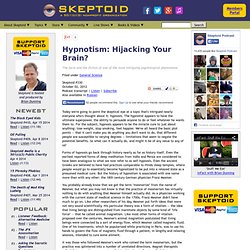
By Brian Dunning, Skeptoid Podcast Episode 330, October 02, 2012 Today we're going to point the skeptical eye at a topic that's intrigued nearly everyone who's thought about it: hypnosis. The hypnotist appears to have the ultimate superpower, the ability to persuade anyone to do or feel whatever he wants them to. For the subject, hypnosis appears to be the miracle cure to just about anything: lose weight, stop smoking, feel happier. We've all heard the basic plot points — that it can't make you do anything you don't want to do, that different people are susceptible to varying degrees — limitations that seem to negate the potential benefits.
Forms of hypnosis go back through history nearly as far as history itself. It was those who followed Mesmer's work who coined the term mesmerism, but the practice was splintered into a number of unrelated directions. So live a little. Follow me on Twitter @BrianDunning. Jean Laplanche. Jean Laplanche (French: [laplɑ̃ʃ]; 21 June 1924 – 6 May 2012) was a French author, psychoanalyst and winemaker.
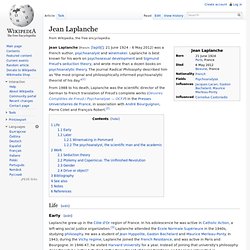
Laplanche is best known for his work on psychosexual development and Sigmund Freud's seduction theory, and wrote more than a dozen books on psychoanalytic theory. The journal Radical Philosophy described him as "the most original and philosophically informed psychoanalytic theorist of his day. "[1] From 1988 to his death, Laplanche was the scientific director of the German to French translation of Freud's complete works (Oeuvres Complètes de Freud / Psychanalyse — OCF.P) in the Presses Universitaires de France, in association with André Bourguignon, Pierre Cotet and François Robert.[2]
La lingüística - Conceptos de Saussure. Vilma Coccoz - El psicoanálisis: una ética para el siglo XXI.